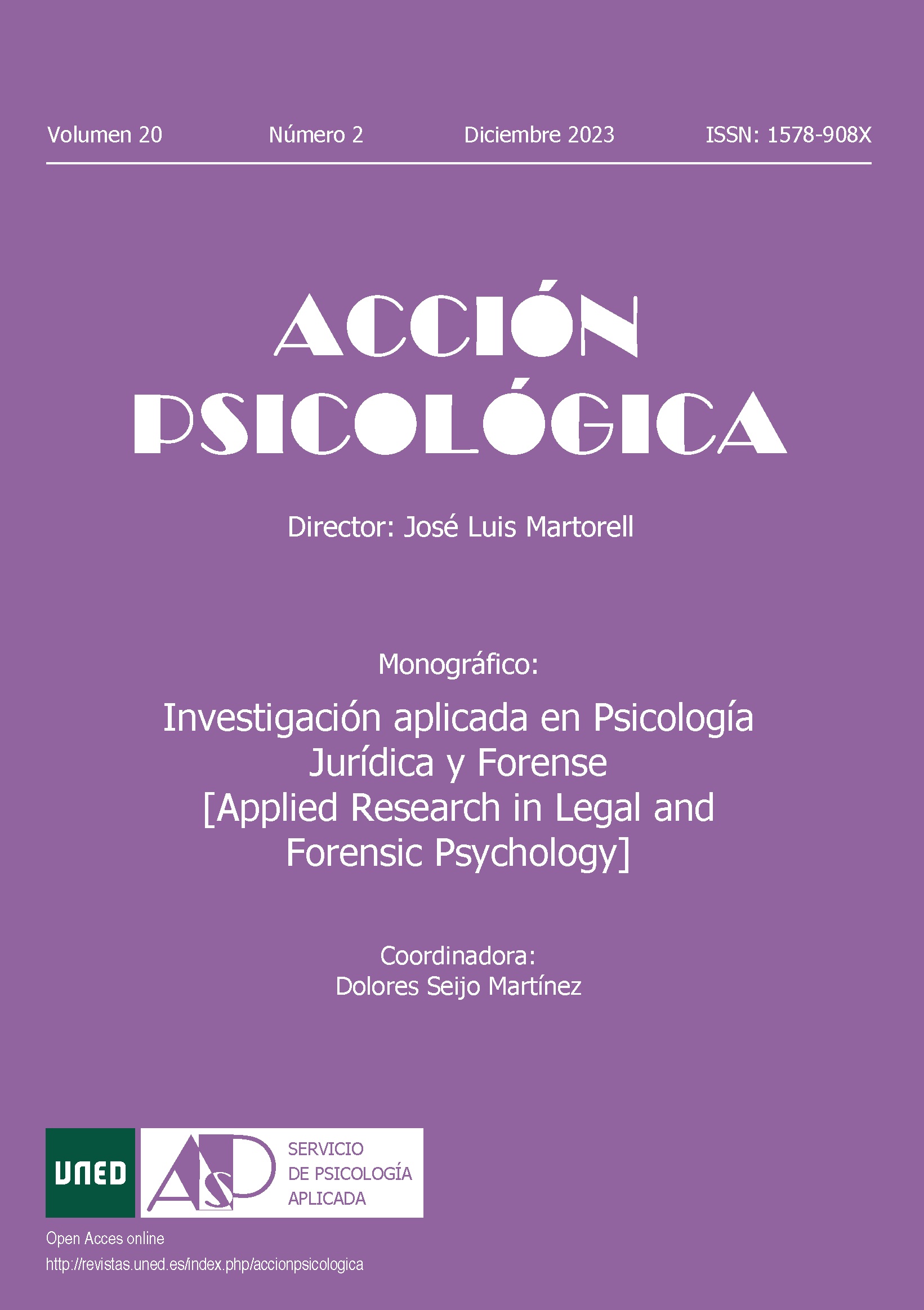¿Una Sesión Corta de Relajación afecta al Control Inhibitorio de la tarea de Stroop en adolescentes?
Short relaxation session in inhibitory control
DOI:
https://doi.org/10.5944/ap.20.2.37533Palabras clave:
Control Inhibitorio, Resistencia a la Interferencia, Relajación, Tarea de StroopResumen
Antecedentes: algunos estudios han indicado que una sesión de relajación y/o meditación podría afectar el control inhibitorio, mientras que otros estudios no han encontrado tal efecto. Dada la discrepancia entre los estudios, el objetivo del presente artículo fue examinar si una breve sesión de relajación podría o no influir en el control inhibitorio. Método: Participaron en el estudio un total de 60 estudiantes con edades comprendidas entre los 16 y los 18 años, distribuidos aleatoriamente en dos grupos, según la condición experimental (sesión de relajación) y control (escucha de material neutro). Se les dio una sesión individual con la grabación (relajación/material neutro durante aproximadamente 7 min.) entre la tarea pre y post Stroop. Resultados: No se encontraron mejoras significativas en el grupo experimental en comparación con el grupo control en Resistencia a la Interferencia.
Descargas
Citas
Basten, U., Stelzel, C. y Fiebach, C. J. (2011). Trait Anxiety Modulates the Neural Efficiency of Inhibitory Control. Journal of Cognitive Neuroscience, 23(10), 3132–3145. https://doi.org/10.1162/jocn_a_00003
Booth, R. W. y Peker, M. (2017). State Anxiety Impairs Attentional Control when other Sources of Control are Minimal. Cognition and Emotion, 31(5), 1004–1011. https://doi.org/10.1080/02699931.2016.1172474
Cahn, B. R. y Polich, J. (2006). Meditation States and Traits: EEG, ERP, and Neuroimaging Studies. Psychological Bulletin, 132(2), 180–211. https://doi.org/10.1037/0033-2909.132.2.180
Eysenck, M. W., Derakshan, N., Santos, R. y Calvo, M. G. (2007). Anxiety and Cognitive Performance: Attentional Control Theory. Emotion, 7(2), 336– 353. https://doi.org/10.1037/1528-3542.7.2.336
Foris, D. (2005). The effect of Meditation. Journal of Undergraduate Research, 8, 1–4.
Fan, Y., Tang, Y. Y., Tang, R. y Posner, M. I. (2015). Time Course of Conflict Processing Modulated by Brief Meditation Training. Frontiers in Psychology, 6, Artículo 911. https://doi.org/10.3389/fpsyg.2015.00911
Golden, C. J. (2020). Stroop. Test de Colores y Palabras – Edición Revisada (Adapt.: B. Ruiz-Fernández, T. Luque y F. Sánchez-Sánchez). TEA.
Gutiérrez-Martínez, F., Ramos-Ortega, M., & Vila-Chaves, J. Ó. (2018). Executive Efficacy on Stroop Type Interference Tasks. A Validation Study of a Numerical and Manual Version (CANUM). Anales de Psicología, 34(1), 184–196. https://doi.org/10.6018/analesps.34.1.263431
Friedman, N. P., & Miyake, A. (2004). The Relations among Inhibition and Interference Control Functions: A Latent-Variable Analysis. Journal of Experimental Psychology: General, 133(1), 101–135. https://doi.org/10.1037/0096-3445.133.1.101
Hayes, S. C., Wilson, K. G., Gifford, E. V., Bissett, R., Piasecki, M., Batten, S. V., Byrd, M. y Gregg, J. (2004). A Preliminary Trial of Twelve-Step Facilitation and Acceptance and Commitment Therapy with Polysubstance-Abusing Methadonemaintained Opiate Addicts. Behavior Therapy, 35(4), 667–688. https://doi.org/10.1016/S0005-7894(04)80014-5
Isbel, B., Lagopoulos, J., Hermens, D., Stefanidis, K. y Summers, M. J. (2020). Mindfulness Improves Attention Resource Allocation during Response Inhibition in Older Adults. Mindfulness, 11(6), 1500–1510. https://doi.org/10.1007/s12671-020-01364-z
Kane, M. J. y Engle, R. W. (2003). Working-memory Capacity and the Control of Attention: The Contributions of Goal Neglect, Response Competition, and Task Set to Stroop Interference. Journal of Experimental Psychology: General, 132(1), 47–70. https://doi.org/10.1037/0096-3445.132.1.47
Luu, K. y Hall, P. A. (2017). Examining the Acute Effects of Hatha Yoga and Mindfulness Meditation on Executive Function and Mood. Mindfulness, 8(4), 873–880. https://doi.org/10.1007/s12671-016-0661-2
Mirabella, G. (2021). Inhibitory Control and Impulsive Responses in Neurodevelopmental Disorders. Developmental Medicine & Child Neurology, 63(5), 520–526. https://doi.org/10.1111/dmcn.14778
Öst, L. G. (2008). Efficacy of the Third Wave of Behavioral Therapies: A Systematic Review and Meta-Analysis. Behaviour Research and Therapy, 46(3), 296–321. https://doi.org/10.1016/j.brat.2007.12.005
Pizzoli, S. F. M., Marzorati, C., Mazzoni, D. y Pravettoni, G. (2020). Web-based Relaxation Intervention for Stress during Social Isolation: Randomized Controlled Trial. JMIR Mental Health, 7(12), Artículo e22757. https://doi.org/10.2196/19236
Ríos-Lago, M., & Periáñez, J. A. (2010). Attention and Speed of Information Processing. En Encyclopedia of Behavioral Neuroscience (pp. 109–117). Academic Press. https://doi.org/10.1016/B978-0-08-045396-5.00208-6
Scarpina, F. y Tagini, S. (2017). The Stroop Color and Word Test. Frontiers in Psychology, 8, Artículo 557. https://doi.org/10.3389/fpsyg.2017.00557
Telles, S., Singh, N., Bhardwaj, A. K., Kumar, A. y Balkrishna, A. (2013). Effect of Yoga or Physical Exercise on Physical, Cognitive, and Emotional Measures in Children: A Randomized Controlled Trial. Child and Adolescent Psychiatry and Mental Health, 7(1), 1–16. https://doi.org/10.1186/1753-2000-7-37
Vaitl, D., Birbaumer, N., Gruzelier, J., Jamieson, G. A., Kotchoubey, B., Kübler, A., Lehmann, D., Miltner, W. H. R., Ott, U., Pütz, P., Sammer, G., Strauch, I., Strehl, U., Wackermann, J. y Weiss, T. (2005). Psychobiology of Altered States of Consciousness. Psychological Bulletin, 131(1), 98–127. https://doi.org/10.1037/0033-2909.131.1.98
Wagener, B. (2013). Autogenic Training, Metacognition, and Higher Education. Educational Psychology, 33(7), 849–861. https://doi.org/10.1080/01443410.2013.785051
Wenk-Sormaz, H. (2005). Meditation can Reduce Habitual Responding. Alternative Therapies in Health and Medicine, 11(2), 42–58.
Descargas
Publicado
Cómo citar
Número
Sección
Licencia
Derechos de autor 2023 Facultad de Psicología. Servicio de Psicología Aplicada.

Esta obra está bajo una licencia internacional Creative Commons Atribución-NoComercial 4.0.
La revista Acción Psicológica se publica bajo licencia Creative Commons Reconocimiento – NoComercial (CC BY-NC). Las opiniones y contenidos de los artículos publicados en Acción Psicológica son de responsabilidad exclusiva de los autores y no comprometen la opinión y política científica de la revista. También serán responsables de proporcionar copias de los datos en bruto, puntuaciones, y, en general, material experimental relevante a los lectores interesados.
Copyright Note
Acción Psicológica is published under Creative Commons Attribution-Non Commercial (CC BY-NC). The opinions and contents of the articles published in Acción Psicológica are responsibility of the authors and do not compromise the scientific and political opinion of the journal. Authors are also responsible for providing copies of the raw data, ratings, and, in general, relevant experimental material to interested readers.












